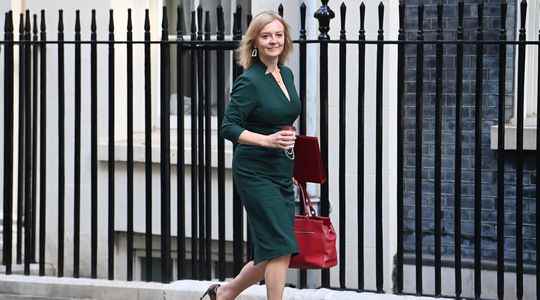The arrival of Liz Truss at 10 Downing Street promises to be unique in many respects. First there is the protocol. For the first time since 1907, a British Prime Minister receives the royal dubbing outside London and Buckingham Palace. Due to the fragile health of Queen Elizabeth II, Liz Truss will travel tomorrow as the leader of the Conservative Party to Balmoral Castle, Scotland, to kiss the hand of the sovereign, an act which seals her official appointment as head of government. .
But it was the circumstances under which Boris Johnson’s former foreign secretary rose to power that made her arrival in Downing Street the most difficult, some would say the most perilous, of a British prime minister since the Thatcher years. .
Liz Truss accumulates the challenges to be met. First of all, the management of his political camp. Since the June 2016 referendum, the conservative party, in power for twelve years, has changed its leader four times, and therefore its prime minister. Brexit has had a profound effect on the country’s first political party, whose rebels, in other words the centrists demanding the lightest Brexit possible, were expelled from the party by Boris Johnson in December 2019. Liz Truss, elected as its leader by the hardline and ideological wing of the party, will have to satisfy both its supporters, but also a larger and more diverse parliamentary group representing an electorate that is no longer silent about its anger and frustrations.
Inflation could reach 14% by Christmas
The files awaiting Liz Truss on her Downing Street office are, to say the least, burning. After two months of “zombie government”, as Keir Starmer, leader of the Labor opposition called it, the British are hoping for quick decisions and strong gestures. First, the country is suffering from galloping inflation, the worst of the G7 countries, and a surge in basic necessities, at the highest levels for 40 years. Inflation could reach 14% by Christmas, according to the Bank of England, and Goldman Sachs economists announce… 22% from the start of next year. And this is only an average, as shown by the activist Jack Monroe, at the head of an awareness campaign among supermarkets, so that they preserve entry-level products, because this are those who also suffer the greatest price increase, such as 40% increase for flour, milk and butter. However, the unorthodox solutions proposed by Liz Truss to fight inflation, such as a massive tax cut, have economists fearing the worst. Even Thatcher’s former Chancellor of the Exchequer, Norman Lamont, warned her: “It would be a terrible mistake to do so. We tried this method in the 1980s and soon had to give up. .”
The specter of the monetary crisis
Moreover, Liz Truss’s declared desire not to follow the recommendations of the OBR (Office of Budget Responsibility) worries economic circles who see a monetary crisis looming on the horizon. They remember “Black Wednesday” and the monetary crisis of 1992 which ended up getting the better of the conservative government of John Major. This had failed to stem the fall of the pound sterling and the rise in interest rates to 15%. However, today, the pound sterling continues to fall, it will soon have lost 20% of its value against the dollar since Brexit.
Another burning issue is the energy crisis, the issue that worries the British the most. With a planned increase, for October 1, of the ceiling for gas and electricity prices by 80%, to 4,250 euros per year and per household, a ceiling that we expect to see rise to 7,000 euros in January , nearly half of the population will have to make difficult choices this winter: heating only certain rooms or heating only a few hours a day. Schools and universities have already warned teachers, parents and students to provide extra sweaters, while some cities (Birmingham, for example) are planning “warm banks”, public places such as libraries and museums, where the public will be welcomed to warm up during the day. If Liz Truss has refused to say so far how she intends to help her fellow citizens pay their bills, she should nevertheless announce support measures this week or, at least, confirm the plan planned for the spring by the Johnson administration to 40 billion euros in aid for the poorest and oldest. Among these aids, 450 euros per year to help British households pay their gas bill. Boris Johnson, however, admitted last Thursday that “this package of measures will not be enough to relieve the British.”
risk of riots
In the meantime, the police are expecting a very difficult winter with the risk of riots and organized theft at petrol stations. The health system has warned that in addition to the 6.7 million patients currently awaiting operations, it will be necessary to treat the consequences of cold and humidity on the most vulnerable and to expect a very clear surplus of mortality. Last week in Whitehall, headquarters of the central administration and ministries, exercises with quaint codenames – “Yarrow” (mille-feuille) and “Noble Birch” (noble birch) – prepared civil servants in the event of a blackout -out repeatedly.
On the plan international, finally, Liz Truss announced that she would trigger article 16 next week, in other words the unilateral renunciation of the Northern Irish protocol signed with the EU, which should further freeze relations between London and Brussels. Will she really, once in Downing Street? What is certain, on the other hand, is that she should rush to kyiv, an obligatory passage for any British Prime Minister in search of recognition. Boris Johnson had been there three times. However, this was not enough to restore its image…
